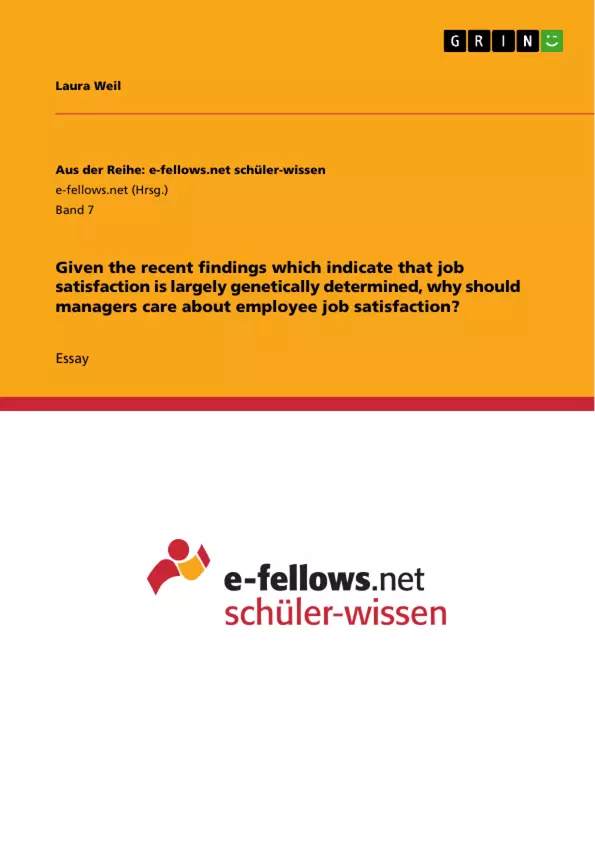Different fields of research showed that companies obtain improved results if their employees are satisfied with their job. Thus, job satisfaction is essential for employees’ job performance. Satisfaction in return is influenced by different aspects: one of which is the individual’s personality.
In the following, I will discuss the question to what extend genes determine job satisfaction, and for what reason and how managers should care about employee job satisfaction. I will refer to a study, which shows how genes influence job satisfaction. The results of the study lead to the assumption that personality influences satisfaction directly. To conclude I discuss the importance of job satisfaction for managers and how they should take care of it.
Inhaltsverzeichnis (Table of Contents)
- Job Satisfaction Genetically Determined
- Introduction
- Definition of Job Satisfaction
- Job Satisfaction: Environmental and Genetic Components
- Correlation to Personality
- Implementation for Managers
- Conclusion
Zielsetzung und Themenschwerpunkte (Objectives and Key Themes)
This essay examines the extent to which job satisfaction is determined by genetics and explores the implications for managers. It discusses the findings of studies that show a genetic component to job satisfaction, specifically related to personality traits that influence how easily individuals are satisfied. The essay also analyzes the impact of job satisfaction on employee performance and explores strategies for managers to foster job satisfaction.
- The genetic influence on job satisfaction.
- The role of personality in determining job satisfaction.
- The link between job satisfaction and employee performance.
- The importance of managers focusing on intrinsic and extrinsic satisfaction factors.
- Strategies for managers to select and retain employees with positive personalities and high job satisfaction.
Zusammenfassung der Kapitel (Chapter Summaries)
The introduction establishes the importance of job satisfaction for employee performance and outlines the essay's objective to explore the genetic influence on job satisfaction and its implications for managers. It introduces the study by Arvey et al. (1989) which examined the role of genetics in job satisfaction. The definition of job satisfaction is discussed, highlighting both intrinsic and extrinsic factors that contribute to satisfaction. The chapter concludes by discussing how personality traits influence job satisfaction.
The chapter on job satisfaction: environmental and genetic components presents the findings of Arvey et al. (1989) and their research methodology using monozygotic twins reared apart. The study revealed a genetic influence on job satisfaction, accounting for approximately 30%. This genetic influence primarily affects intrinsic and general job satisfaction. The authors conclude that while there is no specific “job satisfaction gene”, genetic factors influence the ability to be satisfied with work, which is linked to individual personality.
The correlation to personality chapter discusses the impact of personality traits on job satisfaction. It explores the research by Judge et al. (1998) which identified four key personality factors that contribute to positive personality: emotional stability, self-esteem, self-efficacy, and internal locus of control. Individuals with these traits are more likely to be satisfied with their work and have positive attitudes towards their jobs.
The implementation for managers chapter explores Albert Hirschman’s (1970) "exit-voice-loyalty-neglect-framework" model, which emphasizes the negative consequences of low job satisfaction on employee performance. The chapter highlights the importance of managers taking care of their employees' job satisfaction and explains how managers can address this issue despite the influence of genetics. The focus should be on selecting individuals with positive personality traits and creating a work environment that fosters intrinsic and extrinsic satisfaction through factors like challenging tasks, training, fair compensation, feedback, and job security.
Schlüsselwörter (Keywords)
The key concepts explored in this essay include job satisfaction, genetics, personality, intrinsic and extrinsic satisfaction factors, employee performance, management strategies, and the “exit-voice-loyalty-neglect-framework”. The essay draws on research findings from Arvey et al. (1989) and Judge et al. (1998) to illustrate the genetic influence on job satisfaction and the importance of personality traits in determining job satisfaction. It highlights the critical role of managers in fostering job satisfaction and provides insights into how to achieve this goal.
Frequently Asked Questions
Is job satisfaction genetically determined?
Research by Arvey et al. (1989) suggests that genetics account for approximately 30% of job satisfaction, primarily influencing intrinsic satisfaction through personality traits.
Why should managers care about job satisfaction if it's genetic?
Managers should care because satisfied employees perform better. Even if there is a genetic component, environmental factors and management strategies can still significantly influence overall satisfaction levels.
What personality factors are linked to higher job satisfaction?
Key traits include emotional stability, self-esteem, self-efficacy, and an internal locus of control. People with these traits tend to have more positive attitudes toward work.
What is the "exit-voice-loyalty-neglect" framework?
Developed by Albert Hirschman, this model describes how employees respond to dissatisfaction: they may leave (exit), speak up (voice), stay out of commitment (loyalty), or disengage from their work (neglect).
How can managers improve employee satisfaction?
Managers can focus on providing challenging tasks, fair compensation, regular feedback, job security, and selecting candidates whose personalities align well with the work environment.
- Citar trabajo
- Laura Weil (Autor), 2012, Given the recent findings which indicate that job satisfaction is largely genetically determined, why should managers care about employee job satisfaction?, Múnich, GRIN Verlag, https://www.grin.com/document/263991



